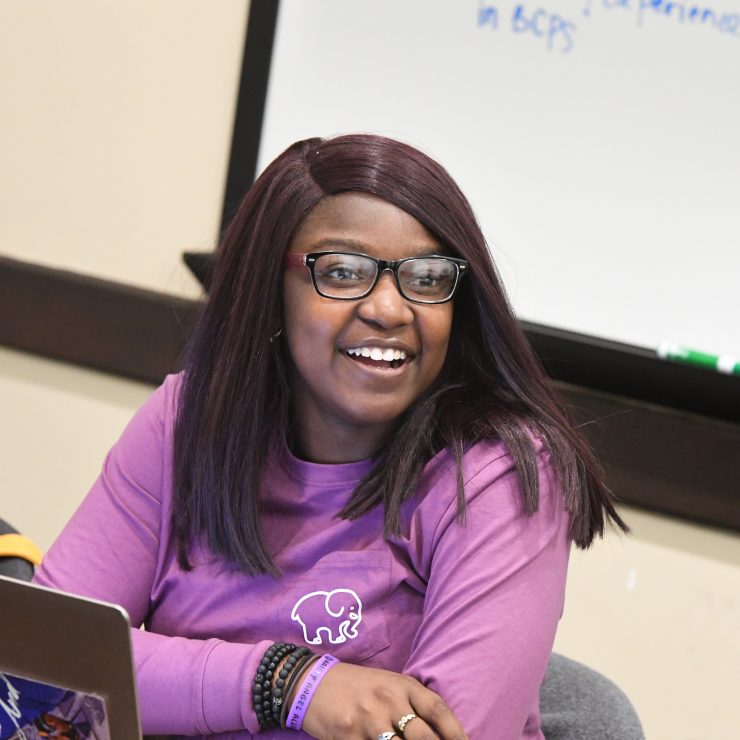The MS in Special Education (Mild-to-Moderate Disabilities) from the Johns Hopkins School of Education is designed for those seeking certification to teach students identified with disabilities.
Across the nation, the demand for teachers is high — and in the realm of special education, the need is critical. Throughout this innovative program, you will build practical skills in evidence-based techniques so that you can support diverse students in a range of educational settings.
There are two focus areas available: elementary/middle school (grades 1–8) and secondary/adult (grades 6–12). With flexible enrollment options for full or part-time study, the program can be completed in as few as five semesters, but coursework must be completed within five years.
Finances should never stand in the way of your educational journey, which is why we offer a range of assistance programs, including RISE-TC. This partnership between Johns Hopkins University and Montgomery County Public Schools provides financial support, hands-on training, and ongoing mentorship for students enrolled in this program.
Graduates are eligible for Maryland state certification in special education, which is reciprocated by many other states. There is a 36-credit option for candidates seeking advanced training without certification. The School of Education is unable to provide F-1 visa sponsorship for this program.
Questions? Please reach out and we’ll be in touch soon.
Upcoming Admissions Events
Have questions about our degree programs, the application, or financial aid and costs? Join us for an inside look at a graduate experience defined by innovation and driven by evidence-based research. Learn more about your area of interest or career path, meet some of our faculty, and connect to the Johns Hopkins School of Education community. Check out our admissions events and register for a virtual information session today.

No Events at this time.

No Events at this time.
Core Faculty
-
Rebecca Cruz, PhD
Assistant Professor
Affiliation
Center for Safe and Healthy Schools, Innovative Teaching & Leadership
Expertise
Education Policy & Politics, Social Context of Education, Special Education

-
Tamara Marder, PhD, BCBA-D
Associate Professor
Program Director, Special Education and Applied Behavior Analysis ProgramsAffiliation
Innovative Teaching & Leadership
Expertise
Special Education

-
Alexandra Shelton, PhD
Assistant Professor
Affiliation
Innovative Teaching & Leadership
Expertise
Learning & Instruction, Special Education

Rebecca Cruz, PhD
Assistant Professor
Affiliation
Center for Safe and Healthy Schools, Innovative Teaching & Leadership
Expertise
Education Policy & Politics, Social Context of Education, Special Education

Tamara Marder, PhD, BCBA-D
Associate Professor
Program Director, Special Education and Applied Behavior Analysis Programs
Affiliation
Innovative Teaching & Leadership
Expertise
Special Education

Alexandra Shelton, PhD
Assistant Professor
Affiliation
Innovative Teaching & Leadership
Expertise
Learning & Instruction, Special Education

Program Overview
The MS in Special Education — Mild-to-Moderate Disabilities prepares candidates to teach students identified with emotional, intellectual, and learning disabilities. The program provides instruction and applied experiences in legal issues, psychoeducational assessment, data-based decision-making, instructional programming, behavior management, and collaborative programming among general and special educators. Graduates are eligible for Maryland state certification in special education, which is reciprocated by many other states.
Two tracks available: elementary/middle school (grades 1–8) and secondary/adult levels (grades 6–12). All candidates complete two internship experiences in which they have the opportunity to demonstrate knowledge learned in the core courses with supervision on the implementation of evidence-based practices covered in coursework. Candidates on the elementary/middle track must complete both internships working with students in grades 1–8. Candidates on the secondary/adult track complete both internships working with students in grades 6–12.
In addition to completing all required coursework and internships, candidates must complete program milestones including successfully passing a comprehensive exam, completing a Culmination Video Analysis of Teaching Project and Presentation OR Graduate Project/Graduate Presentation, and passing the Praxis II examinations (state certification requirement). Upon graduation, candidates will be eligible to apply for Maryland state certification under the appropriate teaching area.
The MS in Special Education (Mild-to-Moderate Disabilities) program also offers a Special Education Teacher Immersion Training (SET-IT) cohort for current Montgomery County Public Schools paraeducators or other permanent school-based employees. The program can be completed in as few as five semesters, although coursework must be completed within five years.
Rising into Special Education Teacher Collaborative (RISE-TC)
The Rising into Special Education Teacher Collaborative (RISE-TC) is a Johns Hopkins-Montgomery County partnership that uses evidence-based, culturally responsive practices to prepare teachers to support students with disabilities in inclusive and special education settings.
$5K Potential Financial Support
A limited number of RISE-TC candidates will receive financial support through stipends of up to $5,000 for educational-related expenses.
$5K Potential Financial Support
A limited number of RISE-TC candidates will receive financial support through stipends of up to $5,000 for educational-related expenses.
After SOE
Our graduates go on to success as special education teachers, resource specialists, and educational consultants, and they are employed in a variety of roles, including lead teacher, special education department chair, or instructional support specialist. Many candidates have also pursued doctorates to become leaders in special education research and training.
Careers
- Preschool Special Education Teacher
- K-12 Special Education Teacher
“This has been an amazing opportunity. I hope to take everything I’ve learned with me along life’s journey and into every classroom that I teach in throughout my career.

Careers
- Preschool Special Education Teacher
- K-12 Special Education Teacher
“This has been an amazing opportunity. I hope to take everything I’ve learned with me along life’s journey and into every classroom that I teach in throughout my career.

Legal Disclosure
Master of Science in Special Education Mild to Moderate Disabilities
State Authorization Disclosure Regarding Educational Prerequisites
Federal regulations require Johns Hopkins to disclose to students considering enrollment or enrolled in this program whether or not it meets educational prerequisites for licensure or certification by state.
Educational Prerequisites for Professional Licensure or Certification
Students who complete approved teacher preparation programs and pass the appropriate state and national teacher examinations are eligible to apply for teacher certification (licensure) in Maryland, and through such certification are eligible for reciprocal certification to the states listed below, See (1). Please be aware that some states may require additional courses or national teacher examinations. Students should contact individual State Departments of Education for the up to date information on current state requirements. Also, be sure to consult the ETS website for the specific tests required by each state.
(1) This program satisfies the educational prerequisites for licensure or certification in the following states: Maryland. Maryland has a licensure agreement that provides for reciprocity with Alaska, Arizona, Arkansas, California, the District of Columbia, Florida, Hawaii, Louisiana, Maine, Michigan, Minnesota, Mississippi, Missouri, New Hampshire, New Jersey, New Mexico, North Dakota, Oklahoma, Rhode Island, South Carolina, Tennessee, West Virginia, and Vermont.
(2) This program does not satisfy the educational prerequisites for licensure or certification in the following states: The licensure agreement provides for reciprocity with conditions in the following states: Colorado, Delaware, Idaho, Indiana, Nevada, North Carolina, Wyoming, Wisconsin, Virginia, Alabama, Connecticut, Georgia, Illinois, Iowa, Kansas, Kentucky, Massachusetts, Montana, Nebraska, New York, Ohio, Oregon, Pennsylvania, South Dakota, Texas, Utah, and Washington.
Students located in a state where their program does not meet that state’s licensure or certification educational prerequisites may have difficulty finding a job in that occupation and/or repaying loans borrowed to complete the program.

